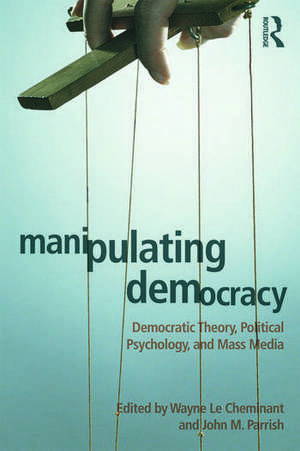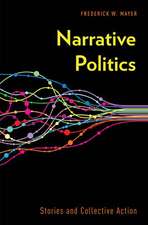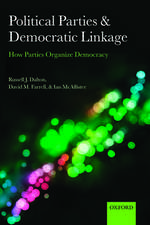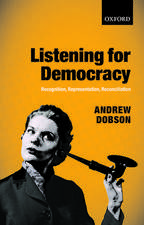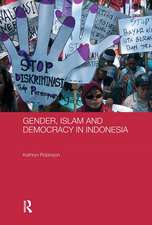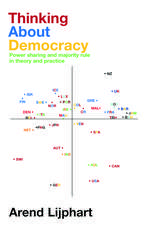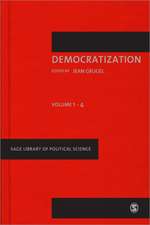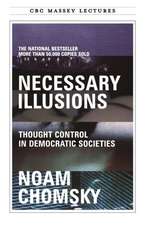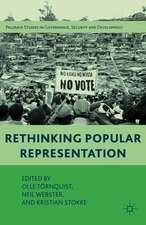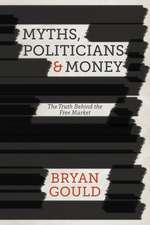Manipulating Democracy: Democratic Theory, Political Psychology, and Mass Media
Editat de Wayne Le Cheminant, John M. Parrishen Limba Engleză Paperback – 23 aug 2010
Manipulating Democracy offers the first comprehensive dialogue between empirical political scientists and normative theorists on the definition and contemporary practice of democratic manipulation. This impressive array of distinguished scholars—political scientists, philosophers, cognitive psychologists, and communications scholars—collectively draw out the connections between competing definitions of manipulation, the psychology of manipulation, and the political institutions and practices through which manipulation is seen to produce a tightly-knit exploration of an issue at the heart of democratic politics.
| Toate formatele și edițiile | Preț | Express |
|---|---|---|
| Paperback (1) | 472.19 lei 6-8 săpt. | |
| Taylor & Francis – 23 aug 2010 | 472.19 lei 6-8 săpt. | |
| Hardback (1) | 1221.26 lei 6-8 săpt. | |
| Taylor & Francis – 23 aug 2010 | 1221.26 lei 6-8 săpt. |
Preț: 472.19 lei
Nou
90.35€ • 98.45$ • 76.14£
Carte tipărită la comandă
Livrare economică 23 aprilie-07 mai
Specificații
ISBN-10: 0415878055
Pagini: 280
Ilustrații: 11 tables and 4 line drawings
Dimensiuni: 152 x 229 x 10 mm
Greutate: 0.52 kg
Ediția:1
Editura: Taylor & Francis
Colecția Routledge
Locul publicării:Oxford, United Kingdom
Cuprins
Introduction: Manipulating Democracy: A Reappraisal (Wayne Le Cheminant and John M. Parrish) Part One: Democratic Theory 1. Manipulation and Democratic Theory (James Fishkin) 2. Manipulation: As Old As Democracy Itself (and Sometimes Dangerous) (Terence Ball) 3. When Rhetoric Turns Manipulative: Disentangling Persuasion and Manipulation (Nathaniel Klemp) Part Two: Political Psychology 4. Changing Brains: Lessons from the Living Wage Campaign (George Lakoff) 5. Emotional Manipulation of Political Identity (Rose McDermott) 6. Mimesis, Persuasion, and Manipulation in Plato’s Republic (Christina Tarnopolsky) Part Three: Mass Media 7. "News You Can’t Use": Politics and Democracy in the New Media Environment (Richard Fox and Amy Gangl) 8. The Betrayal of Democracy: The Purpose of Public Opinion Survey Research and Its Misuse by Presidents (Lawrence Jacobs) 9. The Political Economy of Mass Media: Implications for Informed Citizenship (Shanto Iyengar and Kyu Hahn) 10. Exploiting the Clueless: Heresthetic, Overload, and Rational Ignorance (Andrew Sabl)
Notă biografică
Wayne Le Cheminant is Assistant Professor of Political Science at Loyola Marymount University. He is co-editor of the volume Mormons and Politics: The Lessons of History, Belief, and Practice.
John M. Parrish is Assistant Professor of Political Science at Loyola Marymount University. He is the author of Paradoxes of Political Ethics: From Dirty Hands to the Invisible Hand.
Recenzii
—David Redlawsk, Rutgers, The State University of New Jersey
"In this time of great partisan conflict in politics, threats from abroad, and fear amplified by the mass media, I cannot think of a more timely and important volume. It is high time that the manipulation of public opinion—and American democracy—is given this kind of broad and thoughtful treatment it deserves."
—Robert Y. Shapiro, Columbia University
"In Manipulating Democracy, Professors Le Cheminant and Parrish convene an impressive array of scholars expert in theories of democracy, political psychology, and media to explore the ways by which the voices of a few disproportionately influence democratic governance. The authors here document how a privileged minority plays upon collective emotions in ways that cause the polity to gladly choose charlatans who press nations towards the regrettable and quick instead of the deliberate and considered."
—John Brehm, University of Chicago
"It is not a simple thing to conceptualize manipulation in the context of democracy, where rhetorical and emotional persuasion, the generation of ‘facticity,’ and conflicting narratives constitute the center of political practice. Manipulating Democracy takes on this challenge with great success and without arbitrarily reducing the complexity of the question. The essays in this volume set the terrain for a wide range of exciting future work in an area of research that has until now been poorly conceptualized, and should be read broadly by scholars interested in the fundamental questions of democratic theory and practice."
—Ed Wingenbach, University of Redlands
Descriere
Manipulation is a source of pervasive anxiety in contemporary American politics. Observers charge that manipulative practices in political advertising, media coverage, and public discourse have helped to produce an increasingly polarized political arena, an uninformed and apathetic electorate, election campaigns that exploit public fears and prejudices, a media that titillates rather than educates, and a policy process that too often focuses on the symbolic rather than substantive.
Manipulating Democracy offers the first comprehensive dialogue between empirical political scientists and normative theorists on the definition and contemporary practice of democratic manipulation. This impressive array of distinguished scholars—political scientists, philosophers, cognitive psychologists, and communications scholars—collectively draw out the connections between competing definitions of manipulation, the psychology of manipulation, and the political institutions and practices through which manipulation is seen to produce a tightly-knit exploration of an issue at the heart of democratic politics.
